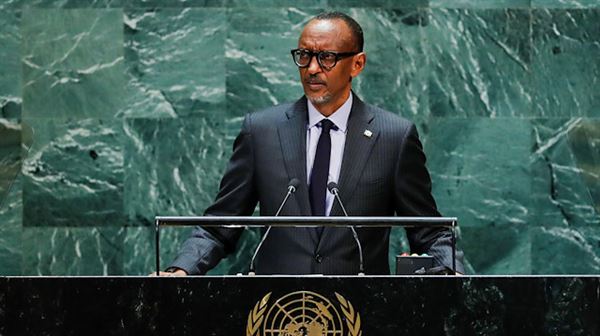Rwanda's new Senators were sworn in on Thursday for a five year-term following their election in September. Up to 20 new senators took oath at a cerem
Rwanda’s new Senators were sworn in on Thursday for a five year-term following their election in September.
Up to 20 new senators took oath at a ceremony presided over by President Paul Kagame in Rwanda’s capital Kigali.
The new lawmakers join another six whose term of office will end in 2020.
At the same occasion the senators elected Augustin Iyamuremye as president of the new Senate shortly after taking oath.
Iyamuremye will be assisted by two vice presidents including Esperance Nyirasafari — vice president in charge of legislation and government oversight — and Alivera Mukabaramba — vice president in charge of economic affairs.
Speaking shortly following the swearing-in ceremony and elections, Kagame challenged the lawmakers to remain close to the citizens in order to understand their challenges and work toward improving their welfare.
“National service especially in leadership position comes with pride and it’s an opportunity to the office holder. I believe it’s an opportunity, but it is an opportunity which should be used properly because it comes with responsibility beyond the technical work,” Kagame told the new lawmakers.
“It is a responsibility to deliver to Rwandans what they expect of you including taking decisions of national interest, and emphasizing our national unity,” he added.
Rwanda’s Senate is comprised of 26 members who serve for a five-year term, renewable once.
These include 12 members who represent the country’s four provinces and capital Kigali, voted through electoral colleges, and eight senators appointed by the president.
Four other senators are nominated by the Consultative Forum of Political Organizations — a forum that brings together 11 political parties in Rwanda — one senator represents public universities and higher learning institutions, while another one is elected from private university and higher learning institutions.
The outgoing senate was elected in 2011 and it completed its mandate last week after serving for eight years.
The senators previously served an eight-year non-renewable term.
But a constitutional amendment in 2015 slashed the period to five-year term, renewable once.
The old Senate completed its constitutional mandate in office last week.
The role of Rwanda’s Upper Chamber of Parliament includes monitoring implementation of the country’s fundamental principles such as fighting genocide ideology, eradication of ethnic divisions and promotion of national unity; equitable sharing of power, and monitoring functioning of political organizations and approval of officials appointed to public institutions.
It also has a shared responsibility with the Lower Chamber of Deputies in matters of legislation and oversight role.
